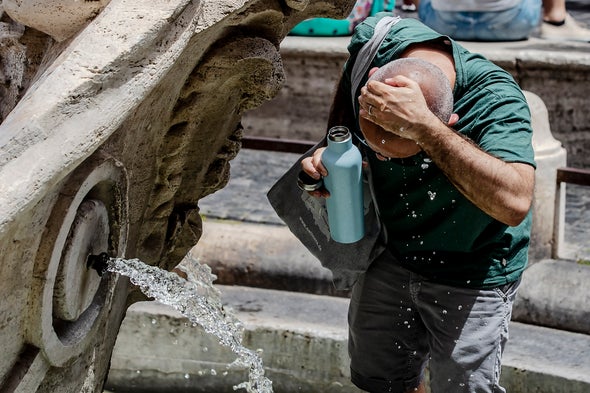
They then zeroed in on 2022, Europe’s hottest summer on record.
It was a season of remarkable extremes. Across the continent, average weekly temperatures rose as much as 6 degrees Fahrenheit higher than usual. All-time temperature records fell like dominos throughout the region. Wildfires sprang up in Portugal, Spain, France and other countries.
Using their model, the researchers estimated that 61,672 people died of heat-related causes across all 35 countries during the summer of 2022. These deaths didn’t strike equally. Older people were more vulnerable than younger people, and women also died at higher rates than men, partly because women accounted for a greater proportion of elderly populations.
Some regions also were affected more strongly than others. The highest mortality rates occurred in Mediterranean countries, particularly Italy, Spain, Portugal and Greece.
These estimates are likely still understated, the researchers caution. The researchers used weekly temperature and mortality data, meaning the model didn’t necessarily account for shorter-term spikes in heat and associated deaths. Actual heat-related deaths in 2022 were probably even higher.
They researchers also point out that the new findings can’t be directly compared to the estimates from 2003. That study used a different kind of methodology, and it also targeted only 16 European countries.
It was also a different point in the Earth’s climate history. Europe’s 2003 heat wave was still an “exceptionally rare event” at that time, the researchers note, even in the context of ongoing climate change.
“This exceptional nature highlighted the lack of prevention plans and the fragility of health systems to cope with climate-related emergencies,” lead study author Joan Ballester, a scientist at the Barcelona Institute for Global Health, said in a statement.
In the years since, many European countries have made efforts to establish prevention plans aimed at educating and protecting vulnerable populations from extreme heat. Yet more than 61,000 people still died during last year’s record-breaking heat event.
The study indicates that the adaptation efforts of the last 20 years have “largely been insufficient” to prevent a wave of deaths during an extreme heat event, the researchers warned.
“The rate of warming observed during the last decade emphasizes the urgent need for reevaluation and strengthening of adaptation strategies,” they said.
Reprinted from E&E News with permission from POLITICO, LLC. Copyright 2023. E&E News provides essential news for energy and environment professionals.
ABOUT THE AUTHOR(S)
Chelsea Harvey covers climate science for Climatewire. She tracks the big questions being asked by researchers and explains what’s known, and what needs to be, about global temperatures. Chelsea began writing about climate science in 2014. Her work has appeared in The Washington Post, Popular Science, Men’s Journal and others.

